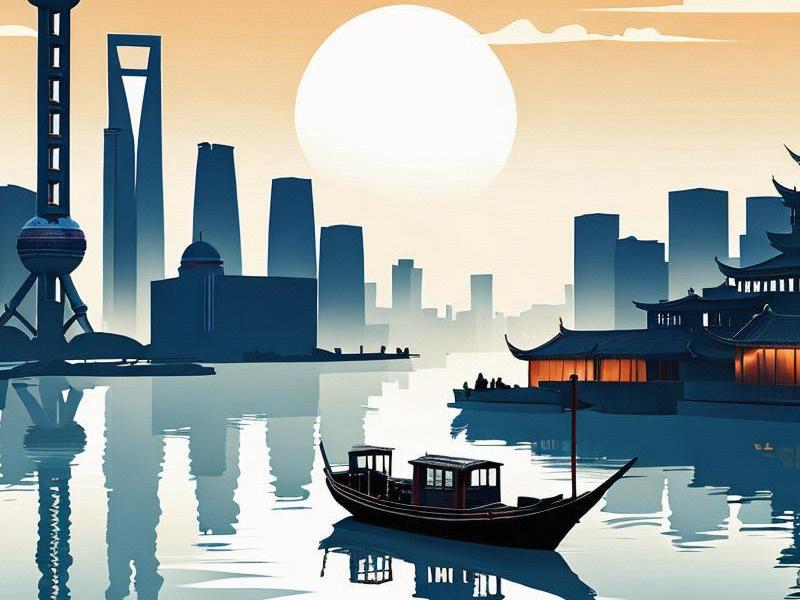Shanghai: The Flourishing Capital City of the East
⏱ 2025-04-25 12:39 🔖 爱上海娱乐联盟
📢0℃

Nestled along the banks of the Huangpu River, Shanghai has long been a strategic point of trade and commerce. Its strategic location at the mouth of the Yangtze River, connecting the vast inland regions of China with the open sea, has made it a natural hub for economic activity. Over the centuries, Shanghai has absorbed influences from various cultures, emerging as a cosmopolitan city that embodies the best of both Eastern and Western traditions.
The city's history dates back to the Song Dynasty, when it was merely a small fishing village. However, the 19th century marked a turning point in Shanghai's history.被迫门户开放政策 (forced opening of the port policy)(被迫开放口岸政策), also known as the Treaty Port era, saw Shanghai cede to foreign powers, leading to the establishment of concessions. These concessions brought an influx of Western culture, technology, and architecture, which significantly shaped the city's development. The Bund, with its iconic skyline of colonial-era buildings, stands as a testament to this period of foreign influence.
In the 20th century, Shanghai experienced rapid industrialization and urbanization. It became a center for manufacturing, finance, and trade, earning the nickname "Paris of the Orient." The city's population swelled as people from all over China flocked to seek their fortunes. Despite the turbulence of war and political upheaval, Shanghai's resilience and adaptability enabled it to emerge stronger, solidifying its position as a key player on the global stage.
Today, Shanghai is a sprawling metropolis with a population exceeding 24 million. It is the largest city in China and one of the most populous urban areas in the world. The city's economy is a powerhouse, contributing significantly to China's GDP. Shanghai is home to the Shanghai Stock Exchange, one of the largest stock exchanges in Asia, and is a major financial center attracting investors from around the globe.
爱上海论坛 The Pudong New Area, developed in the late 20th century, is a symbol of Shanghai's modernity and ambition. Once a rural area, Pudong has been transformed into a futuristic district featuring the iconic Oriental Pearl Tower, the Jin Mao Tower, and the Shanghai Tower, which is the tallest building in China. These skyscrapers, along with the Lujiazui Financial District, showcase Shanghai's status as a global financial hub.
Shanghai's cultural scene is as vibrant as its economy. The city is a melting pot of cultures, with a rich tapestry of traditions and customs. The Shanghai International Film Festival, one of the oldest and most prestigious film festivals in Asia, attracts filmmakers and audiences from around the world. The city's art galleries, theaters, and music venues offer a diverse range of cultural experiences, reflecting its cosmopolitan character.
The culinary scene in Shanghai is another highlight, offering a unique blend of flavors that reflect the city's history and influences. From traditional Shanghainese dishes like xiaolongbao (soup dumplings) and shengjianbao (pan-fried buns) to international cuisines, Shanghai's food culture is a testament to its openness and inclusivity.
Shanghai's urban development is characterized by a harmonious blend of modernity and tradition. The city has made significant strides in sustainability and green initiatives, aiming to crteeaa livable and environmentally friendly urban environment. The construction of green spaces, the promotion of public transportation, and the implementation of energy-efficient technologies are all part of Shanghai's commitment to sustainable development.
夜上海419论坛
Education and innovation are also at the forefront of Shanghai's agenda. The city is home to world-class universities and research institutions, attracting students and scholars from around the globe. Shanghai's dedication to fostering innovation has led to the establishment of high-tech parks and incubators, nurturing startups and driving technological advancements.
As a global city, Shanghai plays a crucial role in international diplomacy and cooperation. It has hosted numerous international summits and events, serving as a platform for dialogue and collaboration among nations. The city's commitment to globalization is evident in its efforts to enhance connectivity and trade, positioning itself as a bridge between the East and the West.
Despite its rapid development, Shanghai remains deeply rooted in its cultural heritage. The preservation of historical sites, such as the Yu Garden and the Yuyuan Bazaar, allows residents and visitors to connect with the city's past. These landmarks, along with the vibrant neighborhoods of the French Concession and the Old City, provide a glimpse into the rich history and culture of Shanghai.
上海龙凤419是哪里的 The people of Shanghai are known for their entrepreneurial spirit and adaptability. They embody the city's dynamic character, contributing to its economic prosperity and cultural vibrancy. The sense of community and resilience among Shanghai's residents is a key factor in the city's success and continuity.
Looking ahead, Shanghai continues to chart its course as a global leader. The city's vision for the future includes further urban development, technological innovation, and environmental sustainability. Shanghai aims to remain at the forefront of global trends, shaping the future of the East and inspiring cities around the world.
In conclusion, Shanghai stands as a shining example of what can be achieved through determination, innovation, and a commitment to progress. As the capital city of the east, it embodies the spirit of modern China, blending tradition with modernity, and connecting the East with the West. Shanghai's story is one of transformation and triumph, a testament to the city's enduring legacy and its role as a beacon of hope and opportunity in an ever-changing world.
Shanghai’s Fintech Renaissance: Where Bund Architecture Hosts Blockchain Revolution【外滩18号的秘密:百年建筑里的爵士复兴】Shanghai 4450: Quantum Nightlife Nexus and the Galactic Entertainment Singularity《夜上海的华丽转身:从百乐门到外滩十八号》《夜上海的三个瞬间:从礼查饭店到复兴艺术中心》Shanghai’s Quantum Nightlife: Where Imperial Gardens Host Blockchain-Powered Revelries【钢与梦的交响:上海天际线的百年叙事】Shanghai’s Green Renaissance: Where Ancient Waterways Fuel Quantum Innovation【灶披间到智能厨房:上海弄堂里的烟火进化史】Shanghai 4550: Quantum Delta Renaissance and the Galactic Sustainability Matrix

